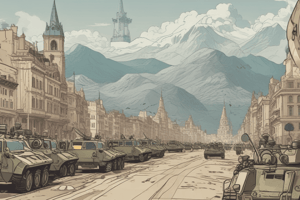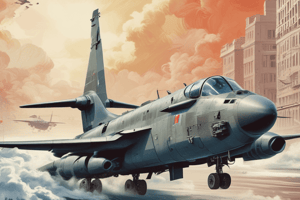Podcast
Questions and Answers
What is the speaker's perspective on the current situation in Europe?
What is the speaker's perspective on the current situation in Europe?
The speaker views the current situation in Europe as an existential moment, where the actions taken will have a significant impact on the future for generations to come.
What event is cited as a turning point in the need for NATO's continued existence?
What event is cited as a turning point in the need for NATO's continued existence?
The 9-11 attack.
What significance did the creation of the alliance hold, particularly in the context of the Cold War?
What significance did the creation of the alliance hold, particularly in the context of the Cold War?
The creation of the alliance offered hope for peace, not just regionally but far-reaching, and was crucial given the presence of Soviet troops in Central and Eastern Europe.
What historical event is mentioned as a milestone in the division of Europe coming to an end?
What historical event is mentioned as a milestone in the division of Europe coming to an end?
How did the Iron Curtain affect contact between Eastern and Western Europe during the Cold War?
How did the Iron Curtain affect contact between Eastern and Western Europe during the Cold War?
What was life like in Communist Romania, according to one individual's experience?
What was life like in Communist Romania, according to one individual's experience?
What is the 'other half of the walnut' referred to by President Truman?
What is the 'other half of the walnut' referred to by President Truman?
What significance did the fall of the Berlin Wall hold for people living in Eastern Europe?
What significance did the fall of the Berlin Wall hold for people living in Eastern Europe?
What is the treaty being signed in the present moment meant to represent?
What is the treaty being signed in the present moment meant to represent?
What was the significance of Hungary's transition to democracy, according to one individual's experience?
What was the significance of Hungary's transition to democracy, according to one individual's experience?
Flashcards are hidden until you start studying
Study Notes
Historical Context
- The fall of the Berlin Wall marked a significant milestone in European history, symbolizing the end of the division of Europe.
The Importance of NATO
- NATO's existence was crucial after 9-11, proving the need for the alliance to continue.
- NATO is the only organization that offers hope for peace to become a real possibility, not just regionally but globally.
Soviet Era
- Soviet troops occupied Central and Eastern Europe, leaving countries with little choice but to join the Soviet bloc.
Personal Experiences
- Growing up in Communist Romania, people had limited access to food, heating, and hot water.
- Listening to foreign radio stations like the BBC and Deutsche Welle was risky, as it could lead to reporting to the secret police.
- NATO was a beacon of hope for freedom and peace.
Berlin Wall and the Iron Curtain
- The Berlin Wall and Iron Curtain separated Eastern and Western Europe, limiting contact between the two for many years.
- People on both sides of the Iron Curtain lived under the threat of mutually assured destruction.
Post-Cold War Era
- The end of the Cold War brought about significant changes, with many countries joining NATO and the European Union.
- Hungary, for example, held its first free elections and experienced a significant transformation.
Studying That Suits You
Use AI to generate personalized quizzes and flashcards to suit your learning preferences.




